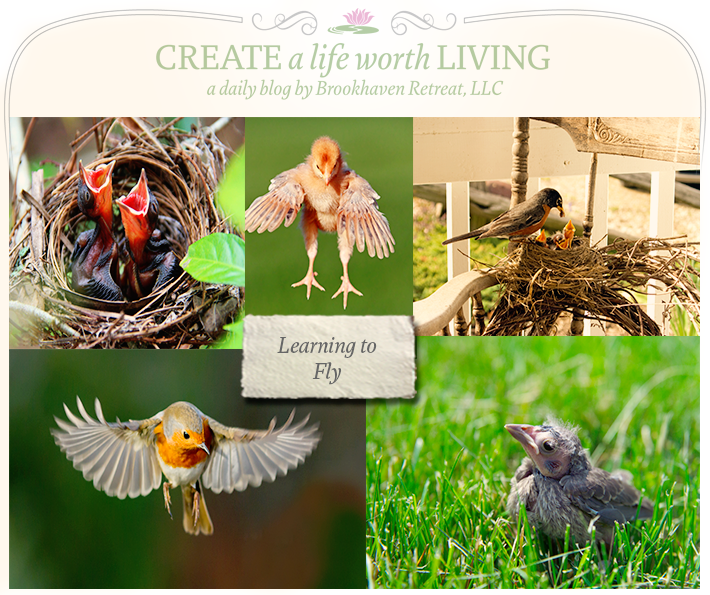
While enjoying my hot tea this morning, I was honored to see the first full nest of summer hatchings fledge. These are baby birds that I have had the privilege to watch from the beginning. For the past several days, the hatchlings would hop to the opening and reach out for food. Sometimes they would spend some time anxiously surveying the yard knowing instinctively that they would soon need to take flight and make their own way.
This morning, I was quite surprised that the timing was right for me to watch the first official fledgling leave the nest. The first one hopped up to the entrance and stood there looking uncertain. Unfortunately for him, the next in line was in a little too much of a hurry and jumped up behind the first, effectively knocking him from the nest. Of course the first one panicked on during the fall but desperate flapping gave way to more purposeful movement and he was able to flutter several feet before coming to a less than dignified landing at the base of a tree. He was soon joined by three more of his siblings. The final hatchling, however, chose not to leap from the nest. He spent several stressed minutes calling out for help while anxiously fluttering his tiny wings. His parents offered reassurance and even some flight lessons but he was not swayed. He went back into the nest and began calling for food.
The longer he stayed in the nest, the more insistent he became in needing to be fed. His anxiety at leaving the nest was causing him to seek reassurance. Patiently, his mother flitted to the entrance several times trying to draw him out. Finally, she climbed into the nesting box and ‘helped’ him out into the air. After a few nanoseconds of panic, instinct kicked in and he, too, flapped his winglets as hard as he could while he hoped for a safe landing at the base of the tree. Unfortunately, life can be harsh for both fledgling chicks and humans. This last fledgling wasn’t quite ready to fly. His panicked flapping slowed his fall but his landing was not graceful.
It’s tempting to stay in the nest. Staying in the nest means life feels safe and protected. If we get thrown out of the nest we either stretch our new wings and fly or we plummet to the ground. Flying poses its own challenges. In order to fly, we must embrace the spaciousness without clinging to the nest. We have to know on a primal level that instinct will kick in and our wings will catch the wind and stop our freefall. We have to overcome our fears and trepidation, trust in ourselves, and let go.
Taking action can be a difficult decision to make. Sometimes, you are ready to leap into change and other times change is unceremoniously thrust upon you. Sometimes you are thrown out of the nest because someone else believes in you and believes that, given the chance, you will be able to soar. When you fall, however, life doesn’t end. You have to get up, dust yourself and make due with your situation. The question is how do we recover from such a fall? How do we awaken our innate ability to fly? The little fledgling that fell from the nest obviously hadn’t developed the skills necessary to fly but, most importantly, he wasn’t abandoned. His parents rushed to his side and led him, hopping and flapping, into the dense brush where the other chicks were waiting. He was provided for as he grew stronger, cared for by the entire flock that called the area home. Eventually, he was ready to fly and was able to take wing with his siblings. In the end, he was no less capable, no less beautiful, and no less musical than his siblings. He just needed a little extra time and encouragement to find his wings.
Sometimes we all reach a point in our lives where we are not quite ready for the next step and need a little assistance. Perhaps we have moved out of our childhood home too early and struggled to maintain our emotional health through challenges faced at college from peer pressure, alcohol, substance abuse, or even physical or emotional trauma that has occurred. Times like these we might need some emotional support to move into the next stage of our existence. Needing assistance does not make you a less capable person. It does not mean that you are weaker or somehow defective. Just like that little bird, you just need some temporary support to be able to show the world just how capable and strong you can be. Be receptive to help and soon, you too will be able to stretch your wings and fly. Pema Chodon put it best. She said, “to be fully alive, fully human, and completely awake is to be continually thrown out of the nest.” Once you survive your first fall, you know for certain that you can rise again.
